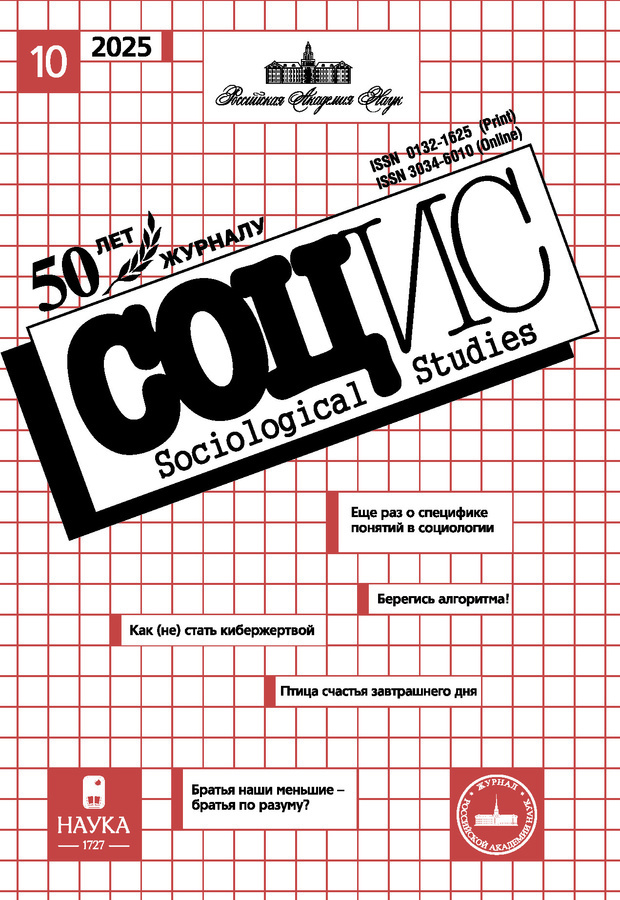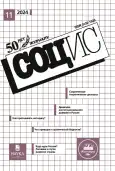Political orientations of today schoolchildren (the сase of Senior Grade High school students in the Sverdlovsk Region)
- Authors: Merenkov А.V.1, Drovneva A.V.2
-
Affiliations:
- Ural Federal University
- Secondary school No. 8
- Issue: No 11 (2024)
- Pages: 161-165
- Section: FACTS. COMMENTS. NOTES
- URL: https://gynecology.orscience.ru/0132-1625/article/view/673744
- DOI: https://doi.org/10.31857/S0132162524110144
- ID: 673744
Cite item
Abstract
In April 2024, the Department of Applied Sociology of the Ural Federal University interviewed 875 high school students from schools in the Sverdlovsk Region. A majority of adolescents 15–17 years old have formed an initial block of political orientations related to awareness: 73% of students in grades 9–11 show interest in information about political events. The greatest activity in the formation of the second block, aimed at developing ability to analyse the goals of social groups involved in political processes, is shown by 10th grade students. High school students are also developing a practice-oriented block of political orientations: 61% consider it necessary to participate in the discussion and implementation of projects for the development of their settlement or region. A worrying signal is absence of actors whose opinions about politics are significantly trusted by high school students, while they still trust their teachers more often than their parents.
Full Text
About the authors
Аnatoliy V. Merenkov
Ural Federal University
Author for correspondence.
Email: anatoly.mer@gmail.com
Dr. Sci. (Phil.), Prof. of the Department of Applied Sociology
Russian Federation, YekaterinburgAleksandra V. Drovneva
Secondary school No. 8
Email: av.troshkova15@mail.ru
Master of Sociology, Advisor to the Director for Education and Interaction with Other Educational Organizations
Russian Federation, Kashino, Sverdlovsk RegionReferences
- Aseev S.Yu., Shashkova Y.Yu. (2020) Politics image in the minds of schoolchildren in Russian regions and Kazakhstan: comparative analysisю Vestnik TomGU. Filosofiya. Sociologiya. Politologiya [Bulletin of the Tomsk State University. Philosophy. Sociology. Politology]. No. 453: 92–97. (In Russ.)
- Batanina I. A., Brodovskaya E. V. (2013) Categories of “values” and “value orientations” in the discourse of the political science community: to the history of the issue. Srednerusskij vestnik obshhestvennyh nauk [Central Russian Bulletin of Social Sciences]. Vol. 29. No. 3(29): 110–123. (In Russ.)
- Merenkov A. V. System of determination of human activity. Yekaterinburg: UrGGA, 2003. (In Russ.)
- Romanova E. V. (2012) Formation of models of political behavior of young people (based on materials of sociological research in the Altai Territory). Vestnik АltGU. Politicheskie nauki [Bulletin of the Altai State University. Political science]. 2012. No. 4–1(76): 254–260. (In Russ.)
- Sobkin V. S. (2008) Adolescent and politics: changing value orientations. Voprosi obrasovania [Questions of education]. No. 4: 180–216. (In Russ.)
- Sobkin V. S. (1997) High school student in the world of politics. Empirical study. Moscow: CSO RAO. (In Russ.)
- Sorokin P. A. (1992) Sociological theories of modern times. Moscow: INION AN USSR. (In Russ.)
- Volodenkov S. V., Artamonova Yu.D. (2020) Information capsules as a structural component of modern political Internet communication. Vestnik TomGU. Filosofiya. Sociologiya. Politologiya [Bulletin of Tomsk State University. Philosophy. Sociology. Politology]. No. 53: 188–196. (In Russ.)
Supplementary files








